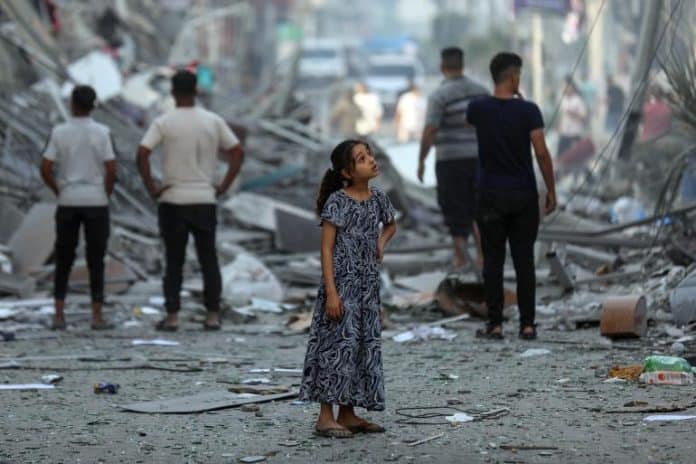The situation in Gaza is fast deteriorating into a catastrophe with potentially irreversible implications for Palestinians as a whole and for peace and security in the region, wrote UN Secretary-General António Guterres in a letter to the Security Council on 6 December.
Invoking Article 99 of the UN Charter for the first time in his tenure as Secretary-General, Mr. Guterres called on the Security Council to “press to avert a humanitarian catastrophe” in Gaza and unite in a call for a full humanitarian ceasefire between Israel and Palestinian militants.
More than eight weeks of hostilities in Gaza and Israel have created “appalling human suffering, physical destruction and collective trauma,” Mr. Guterres added.
On 7 October, Hamas and other Palestinian armed groups launched a deadly attack on Israel, killing 1,200 people and injuring thousands. 240 people were also abducted, including children, women and the elderly, and more than 130 are still held captive by militants in Gaza.
“They must be immediately and unconditionally released. Accounts of sexual violence during these attacks are appalling,” the UN chief added.
Since the start of Israel’s subsequent bombardment and ground operation in Gaza, over 15,000 people have reportedly been killed, over 40% of them children. Some 80% of the population of 2.2 million in Gaza has been forcibly displaced.
A truce in the fighting, reached after negotiations led by Qatar, lasted one week, between 24 November and 1 December. It led to the release of around a hundred hostages in exchange for Palestinian prisoners and facilitated the delivery of aid.
Repetition of past horrors
“The resumption of the military operation and its extension into southern Gaza repeat the horrors of past weeks,” says the Head of the United Nations Relief and Works Agency for Palestine Refugees (UNRWA), Philippe Lazzarini.
For Mr. Guterres, “the return to hostilities only shows how important it is to have a true humanitarian ceasefire.”
Lynn Hastings, the UN Humanitarian Coordinator on the ground, says the conditions necessary for the delivery of aid to the population of Gaza do not exist. “An even more hellish scenario is about to unfold, one in which humanitarian operations may not be able to respond.”
In his letter, Mr. Guterres wrote that amid the constant bombardment and without shelter or the essentials to survive, “I expect public order to completely break down soon due to the desperate conditions, rendering even limited humanitarian assistance impossible.”
Humanitarian aid decimated
While delivery of supplies through the Rafah border crossing continue, “quantities are limited”, the Secretary-General writes. The capacity of the UN has been “decimated” by shortages in supplies and fuel, as well as interrupted communications and growing insecurity. At least 130 of the organisation’s UNRWA personnel have been killed.
Grave concerns persist about waterborne diseases due to the consumption of water from unsafe sources, particularly in the north where the water desalination plant and the pipeline from Israel have been closed, says the UN’s humanitarian agency OCHA.
The World Food Programme (WFP) has warned that the “resumption of hostilities in Gaza will only intensify the catastrophic hunger crisis that already threatens to overwhelm the civilian population.”
No safe place
Initially, the Israeli authorities asked the population to move from the north to the south of Gaza. More than 1.1 million people have sought refuge in UNRWA facilities across Gaza, “creating overcrowded, undignified, and unhygienic conditions,” wrote the Secretary-General, adding that “nowhere is safe in Gaza.”
On 3 December, the Israeli army designated an area covering around 20% of the southern town of Khan Younis for immediate evacuation.
“The evacuation order pushes people to concentrate into what is less than one-third of the Gaza Strip. They need everything: food, water, shelter, and mostly safety. Roads to the south are clogged,” insists UNRWA’s Philippe Lazzarini.
Tensions in the West Bank
While the attacks inside Israel and the escalation of hostilities in Gaza are the focus of attention, the situation in the occupied West Bank, including East Jerusalem, is “alarming” and “urgent”, given the growing and multi-layered violations of Palestinians’ human rights, says the UN’s Human Rights Agency OHCHR.
Since 7 October, 249 Palestinians, including 65 children, have been killed in the West Bank, including East Jerusalem, according to OCHA on 5 December.
The UN Secretary-General said this week he “remains gravely concerned about the escalation of violence in the occupied West Bank, including intensified Israeli security operations, high numbers of fatalities and arrests, spiking settler violence and attacks on Israelis by Palestinians.”
On 16 November 16, some 20 UN human rights special rapporteurs concluded that “grave violations committed by Israel against Palestinians in the aftermath of 7 October, particularly in Gaza, point to a genocide in the making.”
They also expressed concern about a second Nakba, which means “catastrophe” in Arabic, referring to the mass exodus of Palestinians following the 1948 Arab-Israeli war.

